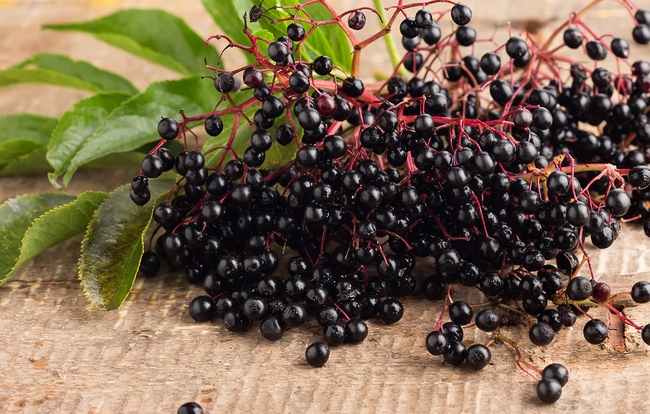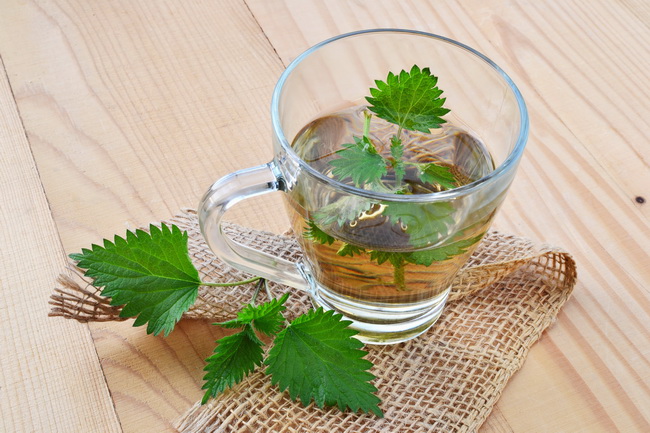- Make It Yourself Lavender Heart-Shaped Bath Bombs!
- 20 Things You Never Knew About “Down There”
- 12 Best Foods For Those Suffering From Arthritis Pain
- 12 Personal Hygiene Mistakes Almost Everyone Makes (Mom Never Told You About #4!)
- 15 Medicinal Plants And Herbs From The Cherokee People
- 12 Mind-Blowing Benefits Of Drinking Coconut Water During Pregnancy
- 12 Outstanding Winter Foods That Won’t Fatten You Up Like A Christmas Turkey
Stop Springtime Allergies Simply by Eating

Photo credit: bigstock.com
As if having springtime allergies wasn’t bad enough, every allergy season seems to get worse and worse thanks to climate change. When the ever-increasing carbon dioxide levels in the atmosphere have nowhere to go, they provide us with warmer temperatures, which can lead to earlier springs and, thus, longer than ever allergy seasons.
If you suffer from allergies every spring, this can be very unwelcome news. There is good news, however. Natural allergy relief is just a snack or meal away. Studies show that foods rich in folic acid and vitamin C reduce the inflammation that comes with allergic reactions. There are studies that have shown that consuming some foods and herbs work just as well as some of the expensive anti-histamines that are on the market.
It’s estimated by the Asthma and Allergy Foundation of America that about 1 out of every 5 people has some type of allergy or asthma symptoms. This means there are about 40 million Americas who suffer from environmental allergies.
Although there is no cure for allergies, getting relief from your allergy symptoms begins with a healthy diet.
Keep reading and discover which foods fight allergies best so that you can include more of them in your diet.
1. Garlic and Onions
Quercetin is like a secret weapon that you can use to help fight allergies. It acts very much like an antihistamine, and both garlic and onions are loaded with quercetin. Garlic strengthens the immune system and makes your body more resistant to both the cold germ and allergens, according to The University of Maryland. Try to eat plenty of these every day to help stop allergies before they start.
2. Apples
Apples are another gift from Mother Nature that is loaded with quercetin, which has those anti-inflammatory and antihistamine properties. One study published in 2006 in the Journal of Investigational Allergology and Clinical Immunology; found that the polyphenols in apples suppressed the release of histamine by reducing auricular swelling and alleviating skin inflammation in studies done with mice. In short, this means that apples were effective in alleviating the symptoms of persistent allergic rhinitis. So follow that old adage and eat that apple every single day (an organic apple, of course!)
3. Elderberries
Elderberries are often heralded as a natural means of treating the flu, but did you know that they also have immune strengthening powers that can provide natural allergy relief? No matter how you want to consume it- elderberry wine, jam, syrup, or juice, this tiny fruit will give you plenty of the beneficial flavonoids that will reduce inflammation and allergy symptoms.
Continue to Page 2

Photo credit: bigstock.com
4. Broccoli
Is there anything this little green powerhouse can’t do? Broccoli contains quercetin, as well as sulforaphane, a very powerful anti-inflammatory. The Journal of Allergy and Clinical Immunology published a study in 2008 which showed that foods rich in sulforaphane, such as broccoli, stimulate an antioxidant response in the body. In fact, the test dose of broccoli that was used caused more than a doubling of the GSTP1 enzyme, which acts as an antioxidant. This is really important since inflammation of the respiratory system is responsible for asthma, COPD (chronic obstructive pulmonary disease), and allergies.
5. Butterbur
The roots and leaves of this shrub contain petasines, which are compounds that block some of the reactions in the body which cause allergies. Although science backs up beliefs that this plant works to fight allergies, it is not recommended for those older than 65, under 10 years of age, or for those with allergies to ragweed. A British meta-analysis of 6 studies found that five of these 6 studies showed that butterbur helped stop allergies. The roots of this plant can contain high levels of pyrrolizidine alkaloids, which can cause liver damage.
Therefore, you should look for butterbur products that either contain only the leaves, or state that the pyrrolizidines have been removed. Both German and Swiss scientists have found that butterbur was as effective as a prescription antihistamine, cetirizine, after just two weeks. Butterbur has also been shown in studies to stop itching eyes, runny nose, sneezing, and stuffy noses in as little as 5 days.
6. Fatty Fish
Fish that are high in omega-3 fatty acids, such as salmon, can help those suffering from seasonal allergies. The journal Thorax published a study in 2007 which showed that women who ate apples and fish during pregnancy had children with lowered risks for developing children who had allergies or asthma. The children of mothers who ate fish at least once a week were less likely to have eczema than children of mothers who never consumed fish.
Continue to Page 3

Photo credit: bigstock.com
7. Stinging Nettle
When you talk about allergy solutions, you have to talk about stinging nettle. This herb will stop the inflammation that happens when you have allergic reactions. Stinging nettle contains histamine, that chemical that your body makes when you have an allergic reaction, which means that over time, your body will acquire a tolerance to it. The best remedy is to buy 500mg of freeze dried stinging nettle capsules at your health food or natural store and take one capsule three times each day.
8. Nuts
As if you needed another reason to keep these on hand for snacking! The journal Thorax published a study in 2007 that found that children in Crete who ate a Mediterranean diet, which is high in fish, olive oil, fruits, vegetables, and nuts, were much less likely to have allergies. Nuts can decrease inflammation around the tissues in the throat and nose that become irritated due to an allergic reaction by the body.
9. Citrus Fruits
All you need is 500 milligrams of vitamin C from whole food sources to help cut down on those allergic reactions. Studies show that this is the amount you need every day for this vitamin to be effective against allergies. Be certain that you eat plenty of oranges, grapefruit, lemons, limes, mangos, and other types of citrus fruits every single day.
Continue to Page 4

Photo credit: bigstock.com
10. Turmeric
This spice from India has a long list of health benefits, but when it comes to allergies, you will want to take turmeric for its powerful anti-inflammatory compounds. Add it to rice, green smoothies, stir fry, and steamed veggies.
11. Kale
This well-known super food has a powerful one-two punch to help you fight allergies. It contains carotenoids and quercetin, both of which fight allergy symptoms. If kale isn’t one of your favorite foods, try eating it baked.
SEE ALSO: 8 Food-Remedies For Allergy Infographic
12. Yogurt
The probiotic compounds in yogurt are thought to be effective in reducing allergic reactions to pollen. Probiotics help to keep your gut flora in a health and balanced state, which will keep your immune system strong. Probiotics also reduce inflammation and decrease the body’s immune system response to allergens.
References:





























